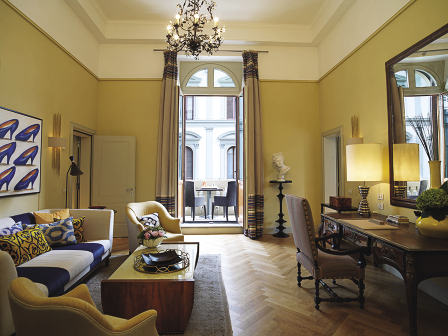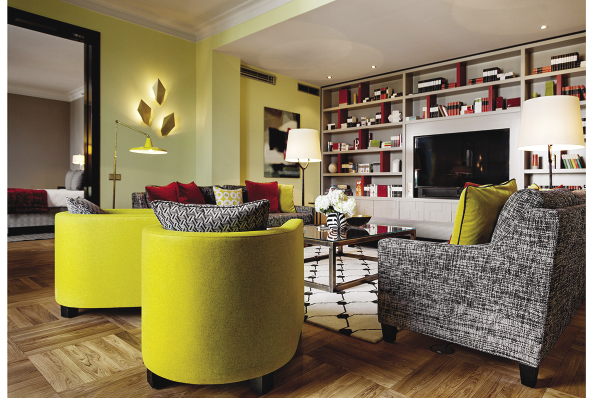- Home
- Media Kit
- Current Issue
- Past Issues
- Ad Specs-Submission
- Ad Print Settings
- Reprints (PDF)
- Photo Specifications (PDF)
- Contact Us


![]()
ONLINE

Forte’s Focus
Editors’ Note
A veteran of the hospitality industry, Sir Rocco joined Forte Plc in 1969, becoming CEO in 1983 and Chairman in 1992, when he succeeded his father Lord (Charles) Forte, who founded the company in 1934. As Chairman, Sir Rocco Forte significantly expanded the overseas operations of the company, with the acquisition of the Meridien Hotel Group from Air France and further transformed Forte from a U.K. operation to a multimillion-pound business and global entity, encompassing several businesses and hotel brands. Sir Rocco was knighted in December 1994 for services to the U.K. tourism industry and received the highest Italian accolade, the Gran Croce dell’Ordine al Merito della Republicca Italiana, for his entrepreneurial merits and strong links with Italy in March 2005. From 1991 to 1996, he was President of the British Hospitality Association and has also been an active member of the Executive Committee of the World Travel & Tourism Council. Sir Rocco was educated at Downside School in England and went on to read modern languages at Pembroke College, Oxford. After graduating, he qualified as a Chartered Accountant in 1969, later becoming a Fellow of the Institute of Chartered Accountants in 1979. Sir Rocco represented Britain at the World Triathlon Championships in 2001, 2002, 2003, and 2007.
Company Brief
At present Rocco Forte Hotels (roccofortehotels.com) operates hotels in key European destinations such as Edinburgh, Brussels, Florence, Rome, London, Munich, Frankfurt, Berlin, and St. Petersburg. In 2009, Rocco Forte Hotels launched Verdura, the company’s first golf and spa resort on the island of Sicily. Plans have also been revealed to further extend beyond Europe and build the company’s presence in the Middle East, with management contracts to operate a hotel in Jeddah.
How has your vision for the company evolved over time?
It hasn’t changed much. We have always emphasized authenticity in our hotels and being part of the city, which others are now trying to emulate. At the time when we started the company, the prevailing concept was to create branded products. For example, with Four Seasons you experienced pretty much the same hotel everywhere you went.
We still have much more individualized hotels than other chains. We work very hard on making each hotel a part of the city. Our general managers have a lot more authority than most chain general managers. Therefore, they can create an atmosphere and feeling that relates to the city the hotel is in.
Another strength we have is that my staff and I are still very involved in caring for this company. I now have two of my daughters working in the business, so it’s a family business that we deeply care about. This creates a warmth and family feel, which is not easy to achieve in every company.

Sitting area of the Repubblica Suite at Hotel Savoy in Florence
Are there certain consistencies so that no matter which location you’re at, when you walk in, you know you’re at a Rocco Forte Hotels property?
Whenever we do a new property, we think long and hard about the place and the theme, and what to do to the hotel to give it that local feel.
In the decor, however, there are touches that you will recognize throughout all of our hotels.
Guests at any property will also recognize our high level of service delivery, which we try to give our guests on a personalized basis. This has been an important focus for us from the early days and, although it is driven from the center, we leave the customization of the delivery to the individual hotels.
One of the roles my second daughter has undertaken has been focusing on a slight rebranding, so we’re looking at all of the service standards and readjusting them to the new brand standards, and creating a uniform approach across the group in terms of how we get the staff to react to the customer.
We’re developing a training program now to teach the staff to interact with the customer in a more natural manner.
Many of the staff normally live an active social life and find it easy to interact with other people and strangers, but for some, it’s more difficult so we have to develop it in them.
Is the profile of your guests relatively consistent throughout all 11 properties? Is it a high-end niche market?
It’s pretty high-end. It varies from hotel to hotel. The location of the hotel has an impact on the clientele, and on the level of leisure versus commercial business that comes through hotels.
Whether guests are corporate or leisure, they’re looking for the same thing: to have their needs tended to and to have what they want delivered to them on a personalized basis.

Living area of the Bebel Suite at Hotel de Rome in Berlin
What is the key ingredient to success for a hotel restaurant?
It’s difficult because a restaurant in a hotel is never going to produce the same level of profitability that the rooms side does, so hotel general managers tend to focus on the room side more than anything else. It’s difficult to get management of hotels to make the restaurant a top priority.
The second thing is that there is a tendency for hotel restaurants to be more expensive than stand-alone restaurants. There is also a tendency for the hotel to try to make sure there is profit from the restaurant. This means that when sales are down, they keep raising the price, and that is counterproductive because it reduces the number of people that use the hotel restaurant.
Also, hotel restaurants have tended to be formal and stuffy in the past, although that is changing today. We have tried to make our restaurants as relaxed as possible from the very beginning and not go for Michelin stars and pompous levels of service. We give very good quality and service but in a relaxed manner.
Is true luxury more about personalization today?
I wouldn’t say it’s more of a focus today. If you go back 50 years to great hotels, they had staffing levels that were three times what you have today. Many of the customers that used the top hotels were people who lived in grand houses and had a large number of staff of their own, and often even traveled with their own staff.
So there has always been a luxury-end focused on delivering high standards of service.
In the post-war era, there were difficulties in that the number of customers who could normally afford to have staff look after them was greatly reduced so it became difficult to deliver the same level of personalized service unless you went to the Far East.
However, at day’s end, top service is what the high-end customer is looking for and that is what we have to deliver.•